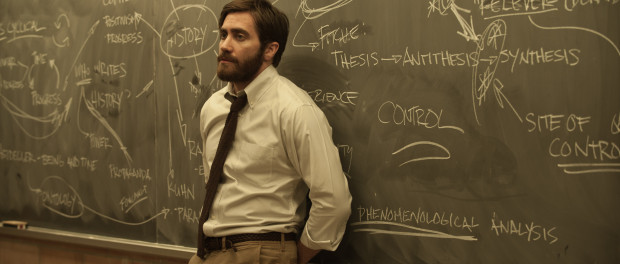Psychological-Thriller Enemy Delves Into The Shadow Side
Everyone dreams of an opportunity to star in films. This does not only turn around money and wealth – the ability to see yourself on television screen is enough. And what if you happen to see an exact copy of yourself on screen while knowing it isn’t you?
After his much acclaimed, gloomy and tortured Polytechnique (2009), Incendies (2010) and Prisoners (2013) Denis Villeneuve offers this experience to the spectator by sending his hero Adam (Jake Gyllenhaal) through the looking glass.
At the heart of the narrative is the persona of a socially repressed hero who, at a colleague’s suggestion, decides to relieve his loneliness by watching a movie, a “masterpiece” of a mediocre lousiness that contains an actor who he recognizes as himself.
So what went wrong? Where does the truth lie? Denis Villeneuve suggests intrigue, which pushes the hero into a nightmarish labyrinth of Kafkaesque motifs and an unusual journey through the metaphysical space of darkness. Sounds scary, doesn’t it?
Enemy is intended as an artistic expression for an intellectual, or for someone who is familiar with the technique and style of Denis Villeneuve inspired by O Homem Duplicado (The Double) by José Saramago, Villeneuve also taps on David Cronenberg’s and David Lynch’s techniques to masterfully turn on the experience of the uncanny.
There is a sense in which this film is not only about “a double” but is a double itself. Collision between viewer and director generates the apparitions of other films which suggest themselves as examples with which to make sense of Enemy.
It seems the conception of the double enables Villeneuve to explore psychological duality: wakefulness and dreaming, the conscious and the subconscious, reality and fiction, rationality and insanity, self-confidence and the complete void, stability and insecurity, where one is highly exposed to the failure of understanding of oneself and the world.
Sound, too is used masterfully. Enemy continues with this feeling of being unbreakable with its film score, as if the situation will continue on endlessly. Villeneuve also introduces implicit resonances throughout the film — disturbing and eerie effects. The same motif recurs, and the whole film becomes illusory and dreamlike. The distinction between real and artificial sound becomes blurred in Enemy. The power and volume of the sound terrorizes.
Fragmented narratives, a gloomy view of the human condition, images representing chaos and unsystematic violence, emphasis on technique over the content, and dystopic views of the future are identified as the characteristic features of this chef d’oeuvre. Villeneuve’s purpose is to set an intellectual challenge for its own sake, to create mystique, and perhaps a controversy. The audience, therefore, must keep an open mind to the director’s vision that crawls from somewhere deep within the artist.
Overall Enemy is a trance-like experience, partly because it deals with the broken dreams of the protagonists, partly because the viewer cannot help but stare at the abstract artistry, but partly because Denis Villeneuve knows exactly what Enemy is about even if the spectator does not. It is not a disconnected, confusing narrative but rather a well-developed, well-directed, well-acted, utterly absorbing film, making it as different from other films as cinema is from other art.
Enemy opens March 14th











